It Just Keeps Getting Worse—KU 2.0 to Pay Authors Half a Penny Per Page Read
Well, as of July 1st, indie authors everywhere know that the Kindle Unlimited situation is way worse than it seemed.
In my previous blog post, I estimated $0.01/page would be paid out under Amazon's new pay-per-page-read scheme. For those of you just tuning in, Amazon will now pay authors in the Kindle Unlimited program per page actually read by the reader. This means if a reader doesn't read some of your book, you don't get paid for it. This model hardly seems fair when, as we all know, it is employed literally nowhere else. You can't exactly pay only part of your Netflix subscription if you don't use it to its fullest extent.
Well, as it turns out, my estimate was a little too generous. We now know that Amazon will only pay out $0.005 per page read across the board.
Half a penny per page read.
I'll let that sink in for a moment.
We got this number from the data they sent us in a recent e-mail, wherein they told us that in June, there had been 1.9B pages read and $11M in the Global Fund from which we get paid. $11M/1.9B = 0.0057, so if you're feeling generous, we're getting about $0.006 a page.
Given that per Kobo's recent study, the average rate of completion on a novel is roughly 60%, a 300-page book would earn about $1.02 per borrow, way less than the $1.35 we were all getting before.
How did this happen? you might be asking. Who the hell signed off on this?!
Well, Hugh Howey did, for one.
Back in September of 2014, Hugh went on a podcast and hailed the idea of "paying a fraction of a penny per page" in the Kindle Unlimited program (1:07:24, for those of you who want to skip right to it). On June 30th, he made a blog post calling concerned authors "hysterical" for not buying into the hype, and Tweeting that the new program would be "profitable, even for short story authors." On July 1st, he refused to comment on the half a penny per-page-read rate, and on July 2nd, he released a new blog post with the ever-so-charming quote:
It doesn’t take as long to write a short story. You shouldn’t get paid as much. End of (short) story.
— Hugh Howey
Just a reminder that this is the guy who made millions off of 15,000-word short stories. Now, apparently, the rest of us are...
...well, I'll let some other quotes from him tell the story.
"The only people who won't profit from this are non-deserving outliers."
So the vast majority of authors enrolled in the program, then?
"...short works are how I quit my day job and made a living as a writer."
That's exactly why so many of them are angry. They won't be able to do that anymore.
"...maybe short story writers shouldn't have quit their day jobs."
So you're gloating about how you were able to do it, but the rest of us are stupid for having done so?
"I just think their outrage has no ethical foundation ... their outrage is based on greed. I'm highlighting that."
Right. Because us parents and veterans and disabled folk are so greedy for wanting to feed our families, am I right?
I tired to get Hugh to clarify his position via Twitter, but that resulted in him blocking me and then taking to Facebook to cry to his fans about how he'd been "attacked." Below you will find images of the tweets I sent to him, or otherwise had him tagged in.
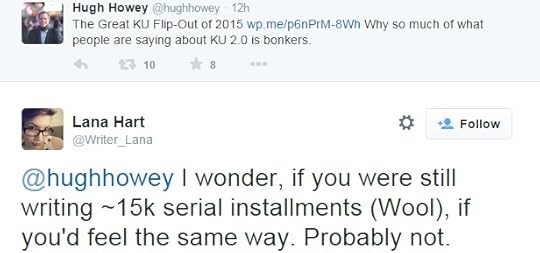
The shock!
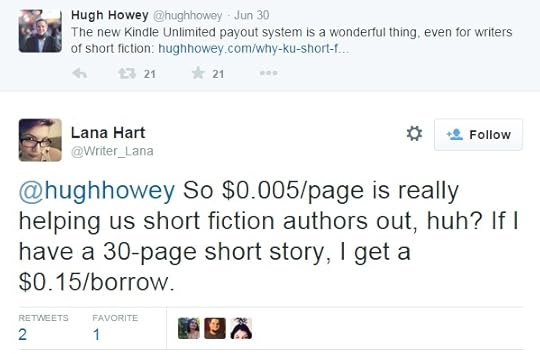
The horror!
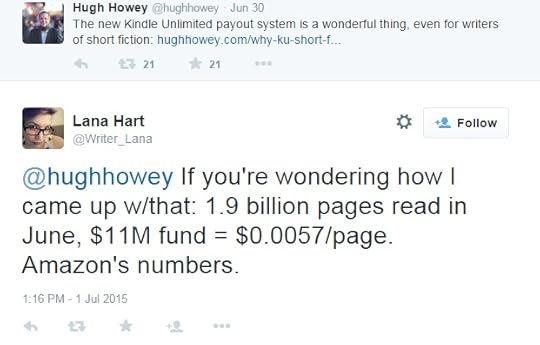
Oh, the humanity!
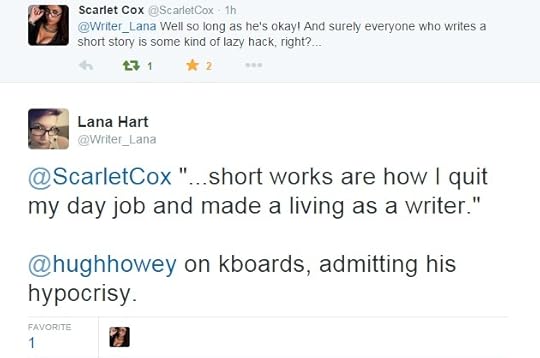
Given how rude he was in his blog posts, I didn't find this one overly harsh.
And finally...
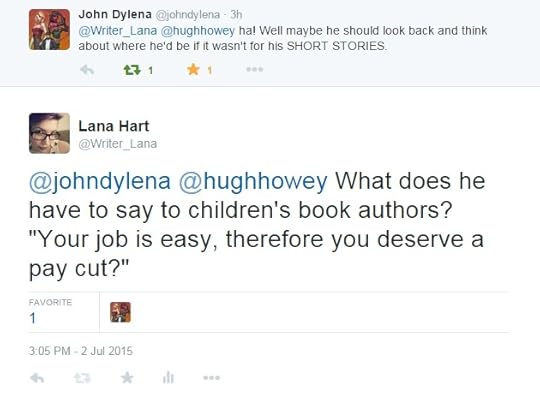
How is this not a legitimate question?
That last point is something in particular I'd like to touch on. Short erotica authors, or short horror authors, or what-have-you are not the only ones who will suffer from this. Authors of children's books and cookbooks and reference manuals will all see a significant decrease in pay because of KU 2.0.
Yet Hugh Howey says we're all Chicken Little. Yes, he goes so far as to denigrate us this way.
"With only one month of information, you couldn't possibly know how the future will turn out," he writes.
Well... we can make some pretty good estimates.
In this fantastic and comprehensive blog post, M. Keep explains how we can extrapolate from an entire year's worth of KU data what we'll see in July and in the fall months.
To quote:
If this change had gone live in June, Amazon has given us the following information:
Base Fund: 11 Million
Pages Read: 1.9 Billion
Average pages per borrow: 210 (I got this number by taking the estimated borrows for June given the typical growth rate, and dividing it by the number of pages Amazon has released)
From this calculation, you can easily find for yourself that in June, we would have been paid $0.0057 per page, and some novelist may be clapping with glee.
So let’s look at July. Given the growth of the fund, and the growth of the borrows, we can estimate the following:
Fund: 13.7 Million
Borrows: 10,261,113
Average pages read: 2.4 billion
Average pages per book: 210
Payout: 0.0057
That's the exact same rate as the rate for June. And the average pages read number is only going to go up from here. Summer is not the season for reading. The fall and winter is when we'll see more pages read.
So unless Amazon is willing to funnel tens of millions more into this Global Fund, our rate of pay can only go down from here.
"But," some novelists are saying, "our books are still getting more money, which is great, because before, short stories were getting paid the same as us, and that just wasn't fair!"
Congratulations. You're making a whopping $0.30 more per borrow than you were before, assuming a 100% completion rate. If it's only 60% read through, you're earning considerably less than you were before.
And mind you, you are earning that $0.30 at the expense of short story authors earning over $1 less than they were before, so if you're interested in fairness, how, exactly, is this a solution?
What it seems to boil down to, for many authors, is an issue of "deserves." Short story authors didn't deserve to make thousands of dollars. Short story authors didn't deserve to make as much as I did. "Poor quality" doesn't deserve as much as "good quality."
Make no mistake that when you hear someone spouting this tripe, what they're actually saying is: "Erotica is not a legitimate form of writing because I'm mad that people would rather read stroke fiction than my 500-page fantasy novel which is actually just a metaphor for getting out of the friendzone."
Not only is that impossibly elitist, I'd wager it's sexist, as well. After all, erotica is written primarily by women for women, and the only other genre you can say that about is probably romance... which gets denigrated just as often in terms of "quality."
Which, I'd add, is a completely subjective metric and should not be used to determine what an author gets paid.
Because the fact of the matter is that the market ought to decide that. Readers ought to decide what is "quality" to them, not a bunch of butthurt novelists who can't see the forest for the trees. That is, in fact, how the system has worked for ages. Fifty Shades, is, in my opinion, terribly written and irresponsible in its romanticizing of intimate partner violence, but that doesn't mean I think E.L. James ought to be paid less for her work. Let her audience decide that.
Which is why the market for short stories continues to thrive on the side of readers actually reading that work. Unfortunately, in this new pay-per-pages-read scheme, that market is no longer viable for authors to write in.
Consider that with the new KENPC standards, your previously 30-page story may now be about 40 pages. If a reader consumes the whole thing, you'll $0.22 per borrow. If not, you'll get substantially less.
If you're hiring an editor (which you should), paying for a cover, and paying for advertising, you may pay an upfront cost to publish. For a short, let's say that's $3/page (based on a novelist on Twitter quoting her per-page average as $8/page). 3 x 30 (the originally, pre-KENPC number, for fairness' sake) = $90 you've paid to produce this book, not to mention all the hard work you've put into it. In order to break even on this title, how many borrows would you need?
KU 1.0: ~67
KU 2.0: ~409
With that kind of discrepancy, it's no wonder that authors are no longer willing to write short stories, despite how many readers would like to read them.
But Lana, you say, KU is an opt-in program. They can just take their books out and have people buy them on other platforms, from now on!
First and foremost, leaving KU has a major impact on visibility. Amazon counted "borrows" as sales, so once those are gone, expect your book to tank.
And secondly, as I pointed out about a year ago, KU has allowed Amazon to pretty much corner the market on eBook sales. So distributing on Amazon, Barnes & Noble, and Smashwords, for instance, will likely hurt your sales as well, since the latter two vendors don't get nearly as much traffic (and since your rank on Amazon has dropped like a stone, no one is going to see your book).
Just like I predicted, indie authors are trapped between a rock and a hard place.
But there is hope.
On Twitter and Facebook, #releasetherate is working on trending. This campaign comes largely from Selena Kitt's efforts to force Amazon to be transparent about what we're making. #paytheartist is another great hashtag to bring awareness to the issue of half a penny per page just not cutting it. Any way you cut it, it simply isn't fair to anyone.
And just so we're all clear, I'm not the kind of person who screams about problems without having prepared a few solutions.
So, Amazon, if you're reading, I'll give you a payment plan that would have been fairer, and yet lucrative for everyone involved. It would have attracted high-quality authors to your program and rewarded them for their effort. Likewise, it would have continued to reward short story authors for giving their audiences what they wanted, too.
Here it is.
LANA HART'S KINDLE UNLIMITED PAYOUT PLAN
Use the current KENPC (which is basically an algorithm designed to standardize page count, using pre-set parameters) tool to actually standardize page counts with a correlation to word count. For the sake of argument, we'll call 5,000 words 20 pages.Use this metric to assign borrow values. Ex.: 20 - 50 pages, $1.00; 51 - 100 pages, $1.10. 101 - 200 pages, $1.20. 200+ pages, $1.30. As long as they are read past the 10% mark, it counts (since on Amazon's site readers can read up to 20% of a book they're interested in for free, I have no problem with this number).EVERYBODY WINS. We all know you were trying to normalize the borrow rate at about $1.30 per anyway, so there you go—only the upper tier gets it.I've already addressed this issue on Twitter, but a few people have voiced concerns that this would just lead some authors to pad out their books for the higher tiers of pay, to which one can only reply: wasn't literally everyone doing that already? And didn't readers do a phenomenal job of not buying books they weren't interested in when authors did that?
I offer this to you, Amazon, completely free of charge. Just implement it soon and get rid of this unethical, unprofitable nightmare and we'll call it even.
Next time on Lana's blog, we'll be discussing how Scribd literally kicked out romance authors from its program from... wait for it... selling too many books. Until then, I'll just hope I didn't make Hugh Howey cry too hard by asking him legitimate questions.



